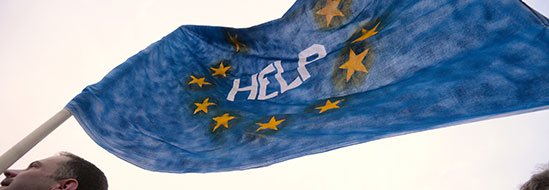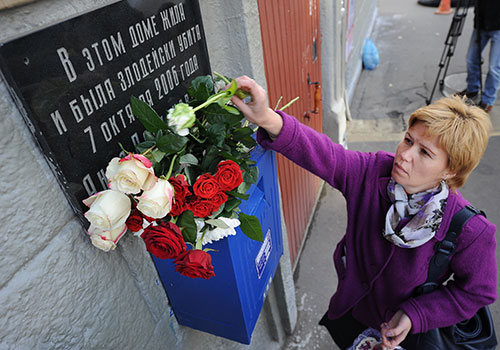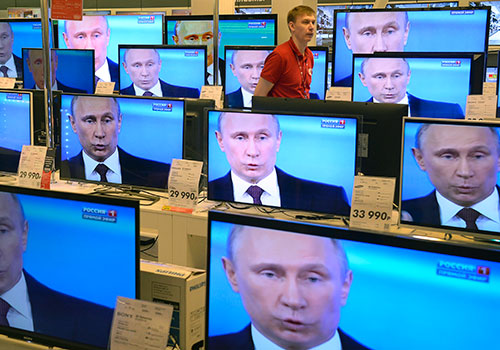Reaction to Russia is too little too late
Russia demonstrates the reality of EU human rights and press freedom diplomacy. In the early 2000s, while focused on economic and geopolitical priorities, the EU largely turned a blind eye to Putin’s rising authoritarianism and, with the exception of the European Parliament, did not react strongly to attacks on the press. Between 2000 and 2015, 26 journalists were killed in direct relation to their work, according to CPJ research, and Russia has consistently featured on CPJ’s Global Impunity Index, a list of counties where journalists are slain and their killers go free.

Based on the 1994 Partnership and Cooperation Agreements and the 2010 Rostov Partnership for Modernization, part of the EU-Russia relationship must be based on freedom, security, and justice, including human rights. But this policy was not exploited. The EU’s approach followed a two-track policy: courting the Kremlin for contracts and engaging it on foreign policy issues such as Iran or Syria, while cautiously supporting Russian civil society. EU diplomats attended trials of journalists, kept in touch with independent media, and funded press freedom organizations, in particular through the European Instrument for Democracy and Human Rights. In 2011, for instance, according to a European Commission statement, grants from €96,000 to €149,000 were handed to the Press Development Institute-Siberia, the Lawyers for Constitutional Rights and Freedoms group, a conference center under the Russian Union of Journalists, and the Mass Media Defense Centre. The European Parliament also used its Sakharov Prize for Freedom of Thought to show support for the press. In 2007, Anna Politkovskaya, a Novaya Gazeta journalist murdered the year before, was a finalist for the prize and, in what was seen as a clear challenge to Moscow, the 2009 prize was awarded to to Oleg Orlov, Sergei Kovalev, and Lyudmila Alexeyeva on behalf the Russian human rights organization Memorial.
EU officials also use human rights dialogues to raise individual cases, particularly when it comes to impunity in murder cases, but Rettman, who reported on such meetings for the EU Observer, told CPJ that such efforts did not amount to much. “The Russians sent the wrong people, not Interior Ministry officials who could follow cases, but low-level diplomats who sermoned on the rights of Russian speakers in Latvia,” he said.
Until the Ukraine conflict, the EU was divided in its approach to the Kremlin. According to think-tank experts in Brussels, many Central and Eastern European countries, in particular Poland and the Baltic states which were part of the Soviet zone of influence, asked for a tougher position. The U.K., Denmark, Sweden, and the Netherlands shared similar concerns while Germany, a key EU actor, tried to find a balance, and France, Spain, Italy, Hungary and, even more, Greece and Cyprus were more likely to minimize Russia’s authoritarian drift to protect economic, energy, and financial interests.

The targeting of independent journalists at this time reinforced those advocating a hard line on Russia and the EU has undoubtedly become more vocal. In June 2015, the report on the State of EU-Russia Relations drafted by Lithuanian MEP Gabrielius Landsbergis (EPP) advocated for a critical reassessment and was adopted by a majority. But for some observers it came too late. “The EU is paying today for its negligence in the 2000s, when it did not adopt an early, firm, and united stand towards Putin’s drift into authoritarianism,” an European External Action Service official, not authorized to speak on the record, told CPJ.
If statements have become increasingly more muscular and sanctions have been imposed over Russia’s role in the Ukraine and the annexation of Crimea, Brussels officials feel powerless as they witness the cascade of laws and regulations, in particular the so-called foreign agents law, suffocating independent journalism and non-governmental activism in Russia.
The few remaining independent news outlets have come under legal, economic, and political pressure. Those reporting a conflicting narrative from the Kremlin’s on Ukraine face the most pressure. In March 2014, Galina Timchenko, editor of Lenta, was replaced after a Russian media watchdog warned that the independent news website was heading toward extremism, according to reports. CPJ documented how in the same year, Dozhd TV was dropped from satellite and cable companies in a move that reduced its audience from 18 million to 2 million homes. The offices of the independent station, which aired live coverage of anti-government protesters in Kiev that Russia’s state-run television had presented as extremists and thugs, were raided by tax officials, and the company from which Dozhd rented the building refused to extend the lease.

Russian authorities have also passed laws and regulations that curb independent and opposition news. Among them is a May 2015 presidential decree banning coverage of military casualties in peacetime, passed as reporters were investigating claims that Russian soldiers were being killed in the Ukrainian conflict—a claim denied by Moscow. The broadcasts, branded dubious by Ukrainian media and international observers, included claims that soldiers were being offered land and slaves for fighting against pro-Russia separatists. To counter Russia’s dominance in the broadcasting sector, the European Endowment for Democracy, supported by a grant from the Dutch government, launched a feasibility study in December 2014 on Russian-language media initiatives. “This is about providing Russian-language alternatives to Russian state broadcasting for societies in the Eastern Partnership countries and beyond,” said Endowment director Jerzy Pomianowski in an interview with Carnegie Europe’s Judy Dempsey.
Russia has not reacted passively to the EU’s tougher stance. In 2012, its Ministry of Foreign Affairs released a report on the deterioration of human rights in the EU, focusing, as the EU Observerreported, on the rise of neo-Nazis, xenophobia, racism, and discrimination against Russian-speaking minorities in the Baltic states. Konstantin Dolgov, Special Representative for human rights, democracy and the rule of law, who was sent to Brussels to confront the EU, accused it of double standards at a 2012 dinner with his counterpart Lambrinidis that CPJ attended in Brussels. Moscow has also boosted its presence in Brussels. Embassy staff have increased from 20 in 2005 to more than 120 in 2015, theEU Observer reported and, according to a 2015 report by Brussels-based watchdog Corporate Observatory Europe, it has partnered with several major public relations companies. Independent Brussels-based specialized Europolitics magazine noted: “The Kremlin can count on at least 76 openly pro-Russian MEPs”—10 percent of the assembly.